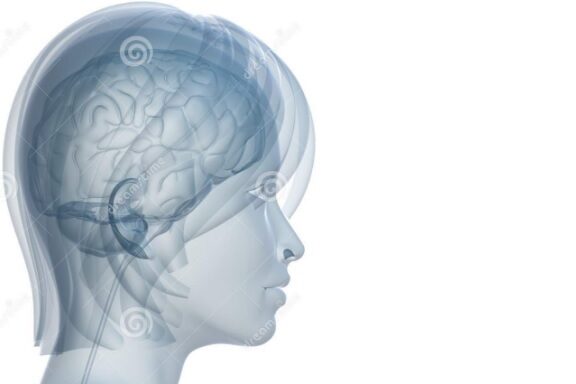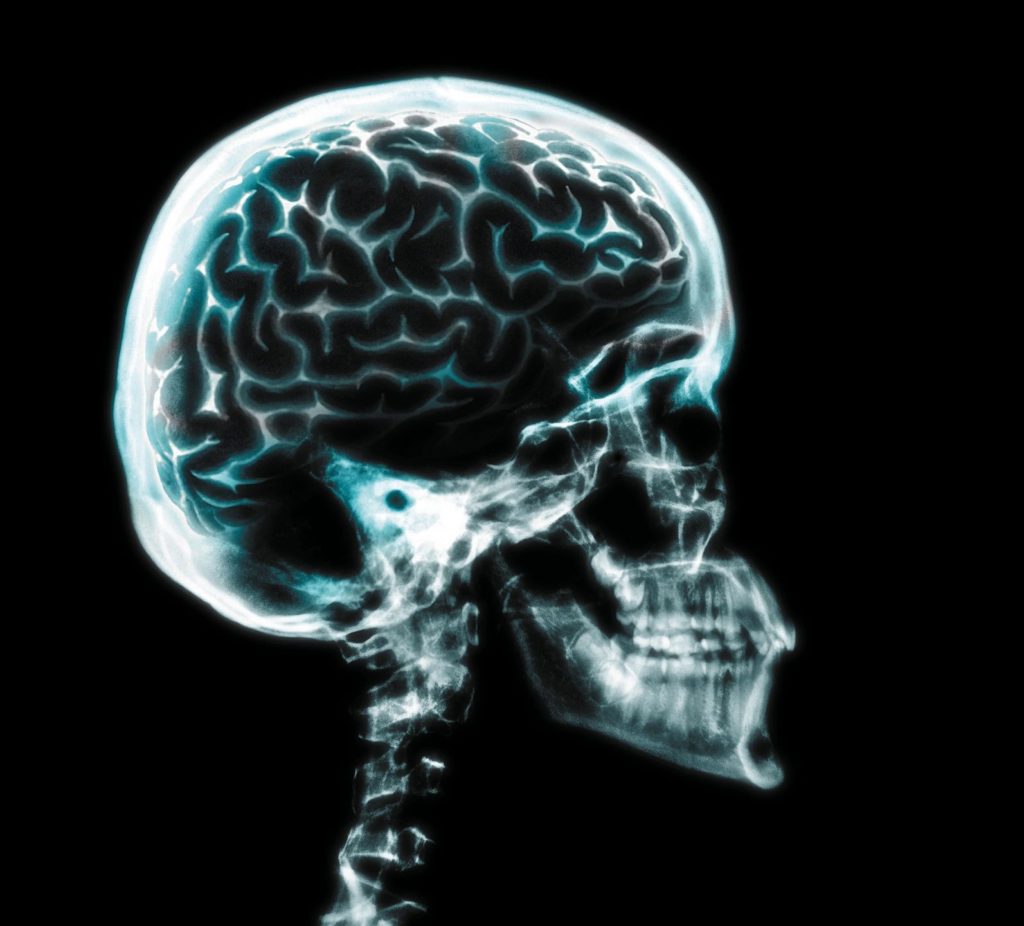
Creatine can assist with brain/cognitive functioning (9). The brain needs significant amount of Adenosine triphosphate (ATP) and research demonstrates that the brain requires a substantial quantity of ATP when engaged with difficult cognitive, or thought related, tasks (9). Creatine supplements can improve the amount of phosphocreatine in the brain. Phosphocreatine or creatine phosphate (CP) is type of creatine molecule that rapidly mobilizes reserves of high energy phosphates in both muscles and the brain, and which can recycle ATP, the main provider of energy at the cellular level. Basically, creatine supplements help with ATP production in the brain. Creatine can also assist with cognitive functioning by improving both mitochondria functioning and dopamine levels (9;25;26). The first, mitochondria, mainly perform cellular respiration, meaning it takes nutrients from the cell, breaks them down, and turns them into energy. The second, dopamine, is a hormone in the body and a neurotransmitter in the brain. As a neurotransmitter it plays a pivotal role in motivation. Creatine is especially helpful with cognition in times of stress (sleep decrepitation, exercise, and stressful cognitive activities like math). Vegans and vegetarians, who tend to lack protein in the diet, may also be assisted by this.
Regarding age related cognitive decline and creatine, research is showing that after two weeks of supplementing older adults show a substantial improvement on both recall ability and memory (49). And, in these subjects specifically creatine supplements could assist with the following: boost brain function; protect against neurological disorders; and diminish age-related muscle loss and concordant loose of strength (50). Keep in mind that creatine from food sources take a lot longer to digest than those from supplements.
Creatine can be an adjunct, or additional, treatment for neurological disorders. Creatine might have protective qualities concerning neurological disorders. Research (primarily animal) implies that creatine can, when combined with medical treatment, help treat the symptoms of neurological diseases, as well as their progression, and even positively impact the life expectancy of those suffering from neurological diseases. This is because several neurological disorders have the same factor in common, a reduction in brain phosphocreatine (27). They also involve an overabundance in stress related reactive oxygen species or free radicals (28). Creatine supplements can increase levels of phosphocreatine, so it can help avoid, or at least slow down the development of, neurological problems. Creatine also helps address free radicals.
Dementia: Creatine helps cells work efficiently, so they don’t have to work as hard, the aging process is slowed and the cells survive longer before dying off. Individuals diagnosed with dementia (Alzheimer’s or Parkinson’s) as well as other conditions have exhibited improvements to brain health after taking creating. It helps to reduce the dosage of other medications and lowers the number of side effects, and helps improve oxygen in the brain. The last improves mental functioning and lowers mental fatigue. It also improves outlook/mood. Creatine can help improve cognitive functioning, even when the person lacks sleep.
Alzheimer’s dementia: may be reduced through the taking of creatine (50). Creatine has, in animal studies, proven to protect brain cells from damage related to beta amyloid plaque toxicity. Alzheimer’s disease is believed to be caused by a build up of beta-amyloid plaques and tangles in a substance called tau. Both are produced within brain cells, reducing or eliminating the cells ability to function properly. Research is showing that those individuals who develop Alzheimer’s have lower levels of phosphocreatine when they enter into the first stages of the disease (50). They experience up to an 86% reduction in the activity of an enzyme (creatine kinase) that stimulates creatine to make energy in cells. They can also experience up to an 14% reduction of in creatine kinase protein expression (50). At its worst, Alzheimer’s symptoms involve confusion, deteriorating cognitive functioning, a loss of long-term memory, and sever dementia. It is now thought that creatine supplementation may assist in protecting against Alzheimer’s, as creatine within cells makes energy.
Creatine may help protect against or even help improve symptoms of dementia. This is because it improves the way cells thought out the body work. All cells have mitochondria, this is where food etc., is made into energy. It becomes dysfunctional before the onset of dementia. It is this dysfunction that may be the root of dementia (109). Cells slowly stop working properly because when energy in the cells is made, by products can also be produced. When energy is created a by-product is also made. It is called lipofuscin or aging pigment. Ideally, it is washed out of the cell. But, with age, it starts to build up and contribute to dementia and its symptoms (problems with memory, lack of decisiveness, Parkinson’s, Alzheimer’s, and dementia). Creatine slows cellular damage from excitotoxicity, specifically damage from a toxic substance called Abeta proteins. It can protect cells from Abeta related damage (87;110). This toxin is specific to Alzheimer’s disease (111).
Creatine also assists in the removal of an age-related substance called lipofuscin. Lipofuscin is a yellow-brown substance that is associated with age-related disruptions to cells ability to remove toxins that can cause damage. Toxins speed up oxidative stress and damage to cells. They also slow the cells’ ability to produce energy. Toxins and the disruptions they cause can result in the effected cells dying prematurely (79;80). In animal research, creatine has been shown to reduce the presence of lipofuscin (82). This allowed for the animals to live up to 9% longer in comparison to animals with the same physical condition but not given creatine. The nine percent in mice when converted into human years is approximately seven years for a human. It should also be noted that the animals given creatine also performed better on tests of neurobehavior (82;113).
Parkinson’s disease may be treated partially with creatine. This condition is characterized by a decrease in dopamine, which is a key neurotransmitter for brain health (2;29). An excessive drop in dopamine production within the brain can lead to brain cell death, as well as many symptoms of Parkinson’s disease including the following: loss of muscle function, tremors, and speech impairments (29). Research (using animals) on creatine and Parkinson’s disease, has shown that creatine supplements can prevent up to 90% of the comorbid loss in dopamine (27). Concerning other Parkinson’s symptoms, sufferers often try to maintain muscle mass to improve strength and functioning, so they weight train. Creatine is a great assistant in building muscle (30;31). One study those Parkinson’s patients who took creatine and did regular load-bearing exercise improve more on measures of strength and daily functioning when comparison to Parkinson’s patients who only did load-bearing exercise (32). Keep in mind that it may be necessary for Parkinson’s patients to take more creatine than healthy individuals. Some studies of Parkinson’s patients and creatine have shown that patients taking between four and ten grams per day, the recommended amount for healthy people, don’t show a significant improvement on measures of daily activity (33).
Huntington’s disease can benefit from creatine. In a (animal) study of creatine supplements and Huntington’s, supplements restored brain phosphocreatine levels to 72% of the subjects’ pre-disease levels, in comparison to only a 26% improvement in the no creatine control subjects (34). Further, this renewal of phosphocreatine facilitated the preservation of daily functioning. It also lowered cell death by about 25% (34).
Creatine supplements may assist with treating other neurological problems (35; 36;37; 38). Keep in mind that much of the research has been done on animal subjects. These diseases include: Alzheimer’s, Brain injury, spinal cord injury, Epilepsy, and ischemic stroke. Creatine is also showing promise regarding Amyotrophic Lateral Sclerosis (ALS), or Lou Gehrig’s disease. ALS is an ailment that affects motor neurons, which are necessary for movement. In this case the brain loses the ability to communicate with muscles. The body loses the ability to move at will. Eventually, the muscles break down, and the ability to walk, talk, eat, swallow, and breathe is lost. In one study creatine improved motor functioning, while reducing muscle loss. It also prolonged the survival rate of patients by about 17.5% (39).
Stroke damage may be improved by creatine: stroke is often the result of a lack of sufficient blood supply to the brain, or some of its parts. Stroke most often occur as a result of insufficient blood supply to areas of the brain. Decreased blood flow to the brain is associated with excessive amount of a substance called lipofuscin within the brain (78). Lipofuscinbuild up is the end result of a disruption of the cells ability to remove dysfunctional components. This ability is called autophagy. As autophagy slows down, and lipofuscin builds up, there is an upswing in oxidative stress, and a concurrent decrease in energy, leading to cell death (79;80 81). Animal studies are showing that creatine has the ability to boost cellular energy and to reduce built up lipofuscin within the brains of the subjects (82; 83). Creatine also assists with the preservation of necessary levels of high-energy phosphate-based molecules within tissues (brain, heart, muscle) needed in times of high energy usage (84;85; 86). Further, creatine enhances the production of ATP, an energy transfer molecule, which helps full cellular metabolism High levels of creatine support the body’s production of ATP, the universal energy-transfer molecule, when ATP itself is used up by these power-hungry tissues (87;88). Some research suggests that cellular level brain damage due to stroke is associated with higher levels of Lipofuscin. So, creatine, with its capacity for depressing lipofuscin, can be of some benefit with this aspect of stroke. Animal studies of creatine administration after stroke (reduction in blood flow) have shown a significant reduction in brain damage regarding the size of the area damaged (89). In addition, creatine supplementation also replenished stroke depleted ATP. Even though there were no human studies of creatine’s impact on stroke related brain damage available when the animal research was carried out, the researchers still suggested that, given creatine’s safety record, those at high risk of strokes consider creatine supplements (89).
References for creatine found here.

The information on this site is for educational and informational purposes only. It is not to take the place of medical advice or treatment. Seek out a qualified health care provider if you have questions or need help. Sharon Grant is not responsible for any possible health consequences of anyone who follows or reads the information in this content. Everyone, but especially those taking medication (over the counter or prescription) should talk with a physician before undertaking any changes to their lifestyle or diet (including taking supplements).